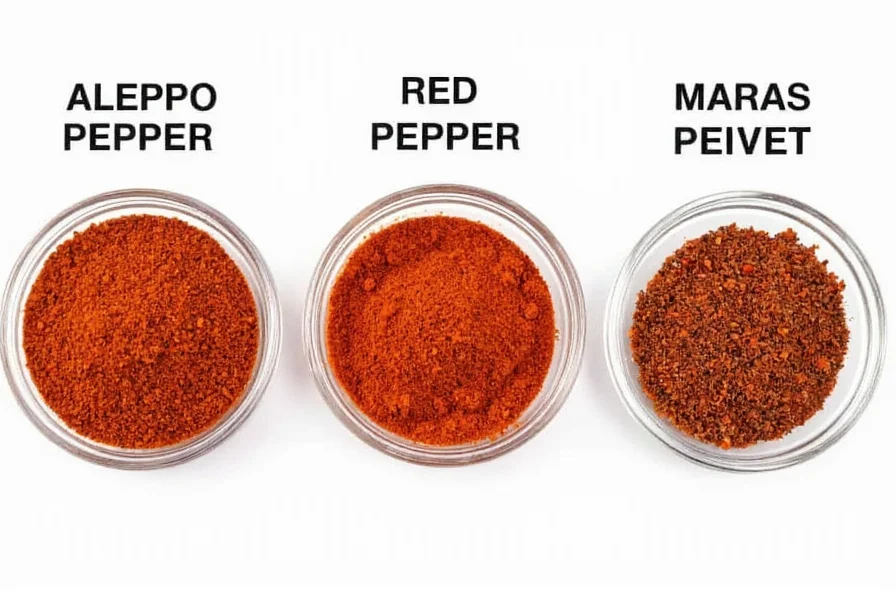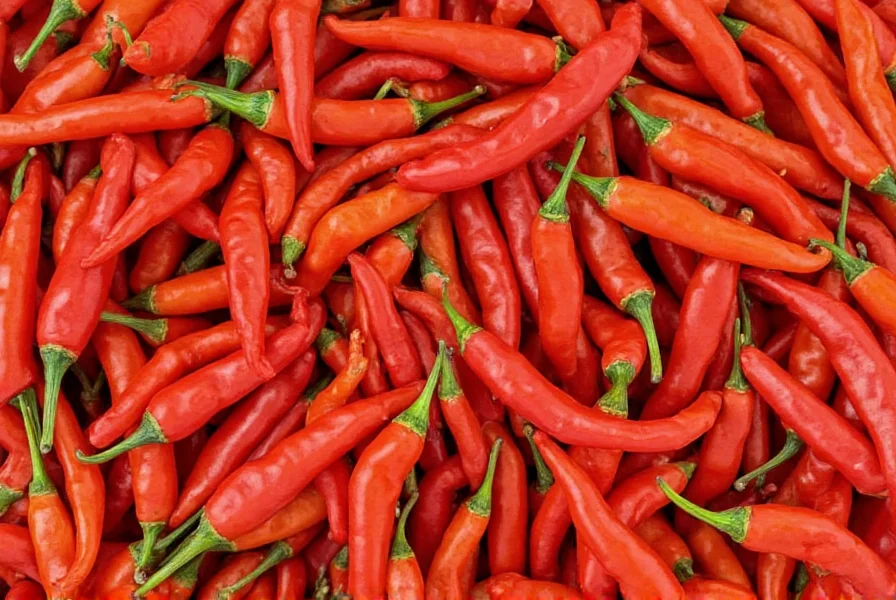The best Aleppo chili pepper substitute is a 1:1 blend of crushed red pepper flakes and sweet paprika. This combination replicates Aleppo pepper's moderate heat (10,000–30,000 Scoville units) and distinctive fruity, slightly tangy flavor profile most accurately for cooking applications.
When you're preparing Mediterranean or Middle Eastern dishes and discover you're out of Aleppo pepper, finding an appropriate substitute becomes essential. This Syrian/Turkish chili, known for its brick-red color and complex flavor, adds both mild heat and subtle berry notes to recipes. Understanding what makes Aleppo pepper unique—its moderate heat level, fruity undertones, and slight saltiness—helps identify the most effective alternatives when you need an aleppo chili pepper replacement for recipes.
What Makes Aleppo Pepper Special
Aleppo pepper (Halaby pepper) originates from Syria and Turkey, where it's traditionally sun-dried and coarsely ground with a bit of salt and oil. Its heat level sits between cayenne and paprika—warm but not overwhelming (10,000–30,000 Scoville units). The distinctive flavor combines:
- Fruity, almost berry-like notes
- Subtle tanginess
- Moderate heat that builds gradually
- Slight oiliness from the processing method
When seeking an aleppo pepper alternative for cooking, you need to balance both heat level and flavor complexity, not just spiciness.

Top 5 Aleppo Pepper Substitutes Ranked
Based on flavor profile matching, availability, and cooking performance, these substitutes work best when you need an aleppo chili replacement in recipes:
| Substitute | Ratio to Replace 1 tsp Aleppo | Heat Level | Flavor Match | Best For |
|---|---|---|---|---|
| Crushed red pepper + sweet paprika (1:1 blend) | 1/2 tsp each | 7/10 | 8/10 | General cooking, marinades, finishing |
| Maras pepper | 1:1 | 8/10 | 9/10 | Authentic Middle Eastern dishes |
| Ancho chili powder + pinch of salt | 1 tsp ancho + 1/8 tsp salt | 6/10 | 7/10 | Slow-cooked dishes, stews |
| Cayenne + sweet paprika (1:2 blend) | 1/4 tsp cayenne + 1/2 tsp paprika | 9/10 | 6/10 | When heat is primary concern |
| Smoked paprika + pinch of cayenne | 1 tsp smoked paprika + 1/8 tsp cayenne | 5/10 | 5/10 | Grilled foods, barbecue recipes |
Detailed Substitute Analysis
1. Crushed Red Pepper + Sweet Paprika Blend (Best All-Around)
This aleppo pepper substitute for home cooks works because crushed red pepper provides the heat while sweet paprika contributes the fruity depth. The 1:1 ratio creates a balanced alternative that performs well in:
- Marinades for meats
- Finishing sprinkled on hummus or labneh
- Tomato-based sauces
- Roasted vegetable preparations
For best results, use freshly ground red pepper flakes rather than pre-ground for more vibrant flavor when creating your aleppo chili pepper alternative.
2. Maras Pepper (Closest Flavor Match)
Originating from Turkey like Aleppo pepper, Maras pepper offers nearly identical flavor characteristics with slightly more heat. If you're looking for the most authentic aleppo pepper replacement, this is your best option, though it can be harder to find outside specialty stores. Use it at a 1:1 ratio in any recipe calling for Aleppo pepper.
3. Ancho Chili Powder + Salt (Best for Slow Cooking)
Ancho powder (made from dried poblanos) provides the fruitiness of Aleppo pepper with less heat. Add a small pinch of salt to mimic Aleppo's traditional preparation. This aleppo pepper alternative for stews works particularly well in:
- Bean dishes
- Slow-cooked meats
- Tomato sauces that simmer for hours
4. Cayenne + Sweet Paprika (When Heat Matters Most)
When you primarily need to match Aleppo's heat level rather than its complex flavor, this combination works well. The 1:2 ratio of cayenne to paprika prevents overwhelming heat while maintaining some fruitiness. This simple aleppo chili substitute is ideal when you need quick heat replacement in:
- Spicy salad dressings
- Quick sauces
- When making small-batch recipes
5. Smoked Paprika + Cayenne (For Smoky Dishes)
While not a perfect flavor match, this combination works well when preparing grilled or smoked foods where the smokiness complements rather than competes with other flavors. Use this aleppo pepper alternative for barbecue when making:
- Grilled vegetable rubs
- Smoked meat seasonings
- Charcuterie board accompaniments
How to Substitute Aleppo Pepper in Recipes
When replacing Aleppo pepper, consider both the cooking method and dish type:
- For finishing dishes: Use the crushed red pepper/paprika blend and add it at the end of cooking to preserve flavor
- For long-simmered dishes: Ancho powder works better as it holds up to extended cooking
- For dry rubs: Maras pepper or the cayenne/paprika blend provides the right texture
- For delicate sauces: Use a finer grind or sift your substitute to match Aleppo's texture
Always start with slightly less substitute than the recipe calls for Aleppo pepper, then adjust to taste. Remember that different substitutes have varying heat intensities, so tasting as you cook is essential when using an aleppo chili pepper replacement.
Storage Tips for Substitutes
Like Aleppo pepper, most substitutes lose potency when exposed to air, light, and heat. For best results with your aleppo pepper alternative ingredients:
- Store in airtight containers away from direct light
- Keep in a cool, dark place (not above the stove)
- Buy in small quantities to ensure freshness
- Grind whole spices yourself when possible for maximum flavor
- Replace ground spices every 6 months for optimal potency
Frequently Asked Questions
Can I use regular paprika instead of Aleppo pepper?
Regular sweet paprika alone lacks the heat of Aleppo pepper. For a better substitute, combine 1 part crushed red pepper flakes with 1 part sweet paprika to match both the heat level and flavor complexity of Aleppo pepper in your recipes.
What's the difference between Aleppo pepper and crushed red pepper?
Aleppo pepper has a distinctive fruity, slightly tangy flavor with moderate heat (10,000-30,000 Scoville units), while standard crushed red pepper is hotter and lacks the nuanced flavor. Aleppo is typically coarser and often contains a bit of oil and salt from processing, giving it a distinctive texture and taste profile that affects how it performs as an aleppo chili pepper substitute.
Can I make my own Aleppo pepper substitute in bulk?
Yes, you can create a larger batch of the 1:1 crushed red pepper and sweet paprika blend for your aleppo pepper replacement needs. Store it in an airtight container in a cool, dark place. For best flavor retention, make no more than a 3-month supply at a time, as ground spices lose potency over time. Adding a bay leaf to the container can help preserve freshness.
Which substitute works best for pizza?
For pizza, the crushed red pepper and paprika blend works best as an aleppo chili pepper substitute. The combination provides the right balance of heat and fruitiness without overwhelming the other flavors. Sprinkle it on after baking for the most authentic Aleppo pepper experience, as the heat of the oven can diminish some of the delicate flavor notes.
Is Aleppo pepper the same as Turkish pepper?
Aleppo pepper is sometimes called Turkish pepper since it's commonly produced in southern Turkey near the Syrian border. However, not all Turkish peppers are Aleppo pepper. True Aleppo pepper has specific flavor characteristics—moderate heat with fruity, slightly tangy notes—that distinguish it from other Turkish chili varieties. When seeking an authentic aleppo pepper alternative, Maras pepper is the closest Turkish variety.











 浙公网安备
33010002000092号
浙公网安备
33010002000092号 浙B2-20120091-4
浙B2-20120091-4